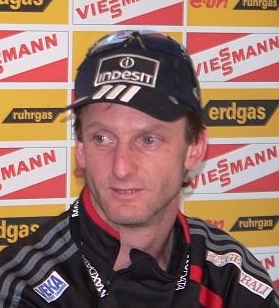Andreas Felder is an Austrian former ski jumper. During this period he dominated the sport, together with contemporaries Jens Weißflog and Matti Nykänen. He finished in the top three overall six times in the World Cup and won the 1990/91 overall. He won his first international championship medal at the 1982 FIS Nordic World Ski Championships in Oslo with a silver medal in the team large hill event.
Karl Schnabl is an Austrian former ski jumper who competed during the 1970s.

Karl-Heinz Luck is a former East German nordic combined skier. His best known for winning the bronze medal at the 1972 Winter Olympics in Sapporo in the individual event. He also won the Nordic combined event at the Holmenkollen ski festival in 1970.

Karl "Bratt-Kalle" Holmström was a Swedish ski jumper who won a bronze medal in the individual large hill at the 1952 Winter Olympics in Oslo. He died in a road accident aged 49.

Heinz Kuttin is an Austrian former ski jumper.
Heinz Wossipiwo is a German former ski jumper who competed from 1971 to 1975, representing East Germany.

Athletes from East Germany and West Germany competed together as the United Team of Germany for the last time at the 1964 Summer Olympics in Tokyo, Japan. 337 competitors, 275 men and 62 women, took part in 159 events in 19 sports.

Athletes from East Germany and West Germany competed together as the United Team of Germany at the 1960 Summer Olympics in Rome, Italy. 293 competitors, 238 men and 55 women, took part in 148 events in 17 sports.

Athletes from East Germany competed at the 1968 Summer Olympics in Mexico City, Mexico. 226 competitors, 186 men and 40 women, took part in 124 events in 18 sports. It was the first time that West Germany and East Germany had sent separate teams to the Summer Olympic Games.

France competed at the 1998 Winter Olympics in Nagano, Japan.

Austria competed at the 1968 Winter Olympics in Grenoble, France.

West Germany competed at the 1972 Winter Olympics in Sapporo, Japan.

Germany competed at the 1952 Winter Olympics in Oslo, Norway after not having been invited to the 1948 Winter Olympics because of their role in World War II, and because the NOC restored in 1947 as Deutscher Olympischer Ausschuß did not represent a recognized state yet. The Federal Republic of Germany was founded in 1949, the NOC for Germany was renamed and in 1951 recognized by the IOC while recognition of a separate NOC of the GDR was declined. East Germans were told to cooperate in a single team Germany, which they declined in 1952, but accepted for 1956 and later.

Germany competed at the 1928 Summer Olympics in Amsterdam, Netherlands. Germany returned to the Olympic Games after not being invited to both the 1920 and 1924 Games. Despite a total absence of 16 years since 1912, German athletes were ranked 2nd. 295 competitors, 260 men and 35 women, took part in 95 events in 16 sports.

Karl-Heinz Bußert is a German rower who competed for East Germany in the 1976 Summer Olympics.
Karl-Heinz Prudöhl is a German rower who competed for East Germany in the 1976 Summer Olympics.

Karl-Heinz Danielowski is a retired German coxswain. He competed for the United Team of Germany at the 1964 Summer Olympics and for East Germany at the 1968 and 1976 Summer Olympics. In 1964 and 1968 he finished in seventh place in the coxed pairs and eights, respectively, whereas in 1976 he won a gold medal in the eight.
Karl Heinz Klee was an Austrian sports official and a lawyer.
Karl-Heinz Lehmann is a German former judoka who competed in the 1980 Summer Olympics.
Karl-Heinz Henrichs was a German racing cyclist. Together with his teammates he won the gold medal in the team pursuit at the 1964 Summer Olympics in Tokyo and the silver medal at the 1968 Summer Olympics in Mexico City.










